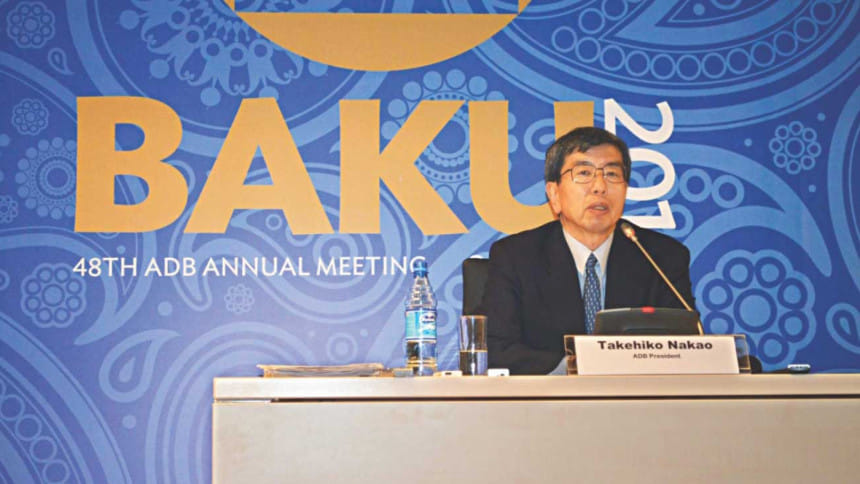ADB vows reforms to stay relevant

The Asian Development Bank is reforming itself to stay relevant to the region that it has served for about 50 years, as a rival in the same continent is gaining prominence.
The ADB dominated by Japan faces questions of its future relevance, with the rise of China-led Asian Infrastructure Investment Bank or AIIB.
Japan and the US own the largest shares in ADB, with over 15 percent each, and have sidestepped calls in the past that would pave the way for a larger stake, and greater influence, for China that has a 6.5 percent stake in it.
In the coming years, the development landscape is set to change. The AIIB, the first major multilateral development bank in a generation, provides an avenue for China to strengthen its presence in the world's fastest-growing region.
The AIIB has won backing from US allies, from Australia to the UK, confounding efforts by the administration of President Barack Obama to campaign against the institution.
ADB President Takehiko Nakao insists the two banks will not compete but complement each other.
"We will maximise cofinancing opportunities not only with our traditional partners but also with new partners," Nakao said yesterday at a media briefing that capped the ADB's four-day annual meeting in Baku, the capital of Azerbaijan.
"We will collaborate and cofinance with the Asian Infrastructure Investment Bank, based on our shared understanding of the importance of safeguard standards."
Battle or no battle between the ADB and AIIB, nations -- from Bangladesh to Vietnam -- stand to gain from the combined resources, as Asia's developing countries need about $8 trillion for infrastructure building until 2020.
So, to stay ahead in the game, the ADB has fused its soft and hard loan windows to boost lending capacity by 50 percent to $20 billion in 2017, while it will rise by up to 70 percent for poor countries.
The reform is seen as a springboard for policy changes across other multilateral agencies -- the World Bank and the International Monetary Fund.
Thanks to the merger, Bangladesh, loosely rated as a lower-middle income nation in the ADB's books, will qualify for more than the annual average fund of $1 billion, which is mostly spent on infrastructure.
"We will keep our focus on low-income countries, and those in fragile and conflict situations," Nakao said.
The merger will give the ADB an opportunity to revisit the balance between country-based activities and regional and global pursuits; to redefine lending terms and eligibilities; and to better engage the bank's borrowers, whose economic success is not yet fully reflected in the bank's management and governance.
The ADB takes pride in reducing poverty in Asia over the past five decades. About 1.4 billion Asians, or roughly 40 percent of the region's population, remain poor, according to the ADB.
"This is unacceptable," Nakao said.
"We also see inequalities increasing in many countries. Continued economic growth supported by sound macroeconomic policies and structural reforms will be key to poverty reduction. At the same time, we need to squarely address the issues of quality of growth and inclusiveness."
The Manila-based lender that allocates 80 percent of its funds for infrastructure will continue to be an important financier of such projects in the region.
Nakao emphasises that infrastructure plays an important role in promoting economic growth and reducing poverty.
"We will do so by adhering to the best international practices on environmental and social safeguards," he said. "We will pay greater attention to inclusiveness and sustainability of infrastructure investments."
The ADB pledged to bolster support for education and health. "We will also help improve governance and capacity of our clients, deepen financial inclusion, and enhance food security and agricultural productivity."
As part of its internal reforms, the ADB -- often blamed for sluggish work -- said it would continue to improve efficiency and effectiveness of its operations.
The ADB is delegating procurement authority to its resident missions -- a reform that Nakao said started to show results.
"We are reviewing resource and skills gaps. We will make the best use of our existing resources."

 For all latest news, follow The Daily Star's Google News channel.
For all latest news, follow The Daily Star's Google News channel. 



Comments